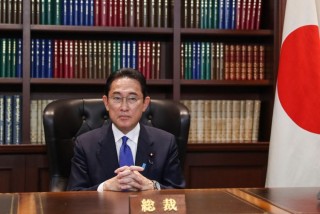Loading
Search
▼ Fumio Kishida Backs Bank Of Japan’s Ultra-Loose Policy Despite Yen Plunge
- Category:Other
Prime Minister Urges Companies That Are Passing Cost Increases On To Consumers To Also Raise Wages
Fumio Kishida has signalled his support for the Bank of Japan’s ultra-loose monetary policy despite the yen’s plunge to its lowest level in real terms since the 1970s.
In an interview with the Financial Times, the Japanese prime minister said the central bank needed to maintain its policy until wages rose and urged companies that did increase prices to raise pay as well.
Kishida said he would continue to “work closely” with Haruhiko Kuroda, ruling out speculation he would end the BoJ governor’s term prematurely or apply political pressure to end negative rates.
“At the moment, I am not thinking of shortening his term,” Kishida said, referring to Kuroda’s 10-year tenure as BoJ governor which will end next spring. “I will look ahead to the expected economic conditions of April next year in my deliberations on choosing the right person for the job.”
In a signal of how starkly the economic challenges in Japan contrast with those in other advanced economies that are wrestling to protect the public from runaway inflation, Kishida said the country needed wage increases rather than wage restraint.
The government will prepare measures to help companies raise salaries even as they pass on increasing input costs, Kishida said. His comments came amid rising public concern about cost of living increases and a sharp fall in the prime minister’s popularity.
The yen, which was trading flat on Tuesday morning, edged down as much as 0.1 per cent against the dollar to ¥145.83 in the wake of Kishida’s comments, close to the low of ¥145.90 touched last month that prompted Japanese authorities to intervene to strengthen the currency.
“By passing on rising prices, we hope businesses will have some latitude to raise wages,” Kishida said. “In the past, wage hikes were viewed as a cost factor, but going forward, companies need to invest in people for the economy and for businesses themselves to grow.”
The BoJ’s policy stance, which has helped push the yen to a 24-year low against the dollar, will be offset by government measures to combat inflation and take advantage of the weak yen to boost exports and tourism.
The prime minister’s comments followed a volatile period for the yen and mounting speculation that after almost a decade of unwavering commitment to its ultra-loose policy, global turmoil might finally force the BoJ to blink. Shortly before Kishida spoke to the FT, the yen fell to ¥145.60 against the dollar and to within ¥0.30 of the level at which the Japanese authorities intervened last month.
Such efforts to strengthen the yen, which have cost $20bn, will have little effect as long as the interest rate differential between Japan and the US continues to widen, analysts warned. Japan has faced the same pressures as the US and Europe from the surge in global energy and food prices.
But headline inflation remains relatively low at 3 per cent since there has been almost no transfer from price increases to higher wages. The rise in energy prices has also been partially offset by long-term contracts for Japan’s large imports of liquefied natural gas.
The BoJ has argued that underlying consumer demand in the Japanese economy is weak and has predicted that inflation will fall back below 2 per cent in the next fiscal year.
Companies, in particular the small and medium-sized businesses that employ 70 per cent of the workforce, have struggled to transfer higher costs to consumers, resulting in pressures on profits that have made it harder for them to raise wages.
Following decades of on-and-off deflation, economists said Japan could be on the cusp of a historic transition as the global energy crisis forces businesses to raise the prices of their products, creating pressures that will prompt workers to demand a pay rise.
“It’s hard to put a figure on what level of inflation is appropriate,” Kishida said. “But I strongly feel that we would not be able to maintain a sustainable economy or protect people’s livelihoods without seeing a hike in wages that is commensurate with price rises.”
- October 11, 2022
- Comment (0)
- Trackback(0)


